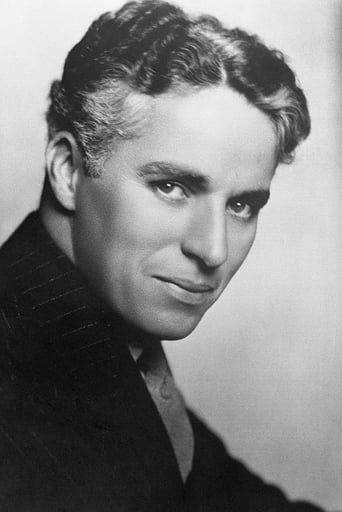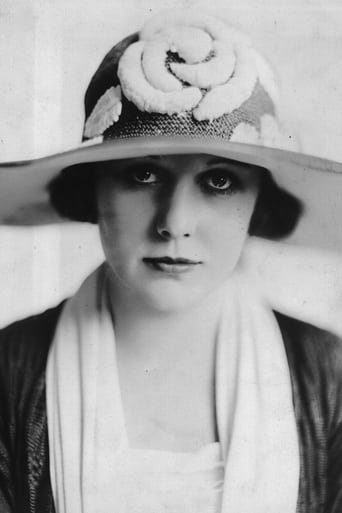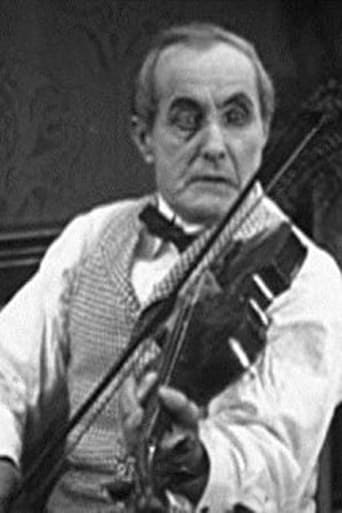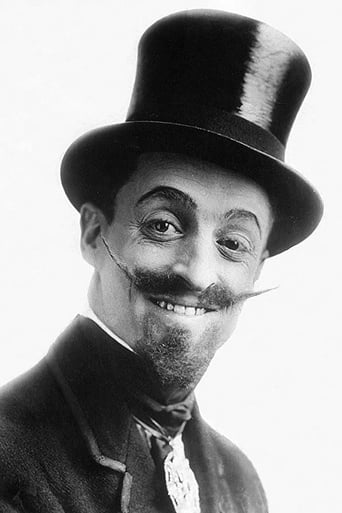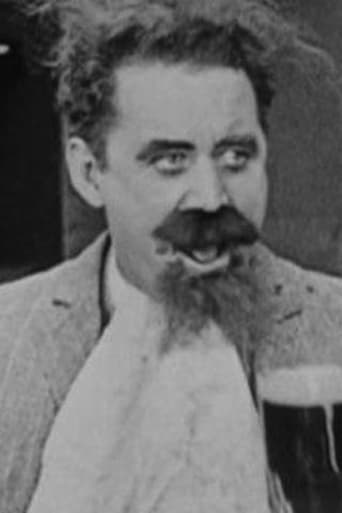Evengyny
Thanks for the memories!
BlazeLime
Strong and Moving!
Baseshment
I like movies that are aware of what they are selling... without [any] greater aspirations than to make people laugh and that's it.
Matho
The biggest problem with this movie is it’s a little better than you think it might be, which somehow makes it worse. As in, it takes itself a bit too seriously, which makes most of the movie feel kind of dull.
Tom Gooderson-A'Court
Charlie Chaplin's penultimate film for Essanay is regarded as amongst the best of his output for the company. The film was actually released after his first film for the Mutual Film Corporation The Floorwalker, over five months after his previous Essanay film Burlesque on Carmen. Another interesting release related fact is that Police released over two years before his finally Essanay film Triple Trouble which was created in part by Chaplin regular Leo White by piecing together unused shots from other Chaplin films including this and the unfinished feature Life. Police stars Chaplin as a recently released convict trying to make it in a cruel and hostile world. The initial plot follows along the same lines as much of Chaplin's work. There were portions of Police that reminded me of Modern Times and the idea of the Tramp struggling to survive was used by Chaplin time and time again. It has been suggested that Chaplin borrowed the plot from Broncho Billy's His Regeneration for which he had an uncredited cameo and I agree that the character development at least is shared between the two.Having been swindled by a dodgy God botherer and having no money to pay for a bed for the night, the ex-con is held up at gunpoint by a man who turns out to be his ex-cell mate (Wesley Ruggles). The thief convinces the Tramp to assist him in robbing a nearby house and the two set about breaking in. Once inside they are confronted by the Daughter of the House (Edna Purviance) and chased by a number of Cops (Leo White, John Rand & Fred Goodwins). The Tramp manages to become the hero of the piece late on when he saves the Daughter of the House from a nasty attack. Police begins very promisingly with some wonderful comic business early on. A highlight came when Chaplin visited a fruit seller and tried numerous apples, taking a bit and putting them back until he found one to his liking. The first time he put an apple back I actually snorted with laughter. I also enjoyed the scene in which Chaplin meets his ex-cell mate and sneakily robs him while the man is searching Chaplin for money. It's subtle and clever. On a technical level the film is very good. I liked the scene in which Chaplin and Ruggles were shown only in shadow. This isn't something I remember seeing from Chaplin before and felt a bit German expressionist. I also thought that the use of filters was very accomplished. Filters are one of my least favourite aspects of early cinema but here Chaplin uses them well, leaving you in no doubt as to the time or setting of a scene. I felt that the second half didn't quite live up to the first and certainly wasn't as funny. That being said it was actually more reminiscent of later Chaplin, forsaking jokes in favour of plot and character development. Unfortunately the romantic element just doesn't live up to the likes of City Lights and the film's ending is a little flat. www.attheback.blogspot.com
Steffi_P
With this picture Charlie Chaplin ended his fruitful tenure at Essanay. While he had produced a handful of better shorts in that period, Police does show off everything he had developed and perfected during his time at the studio. So let's recap with Charlie.The first thing that is very evident is Chaplin's confidence in his own material. In contrast to the high-speed slapstick that made up virtually all silent comedy up to this point, Police contains lots of slow and subtle visual gags that rely upon the audience's ability to relate to the situations and pay attention to detail. So we get moments like Charlie drying his eyes on the preacher's beard, or getting into the habit of patting his pockets for change every time someone offers to help him go straight. The sedate pace of the bulk of the picture means that when we do get a bit of fast-paced action it has more impact.However, the clearest and perhaps the most important development Chaplin made at Essanay was the ability to create stories. His first few Essanay pictures don't really have plots, and are just half an hour of antics based around a single location. With Police there is a well-defined structure, and this is probably the strongest and most carefully balanced story he has made so far. There is a consistent theme of Charlie trying to give up crime, and this is set up in the first scene and resolved in the last one. The love angle with Edna Purviance is also neatly established, with them running into each other part way through the burglary, and their relationship built-up and woven into the redemption idea. Perhaps this all sounds a bit high-minded for a comedy, but it is important because it helps the audience connect to the character and gives the jokes a bigger pay-off.Ever the pragmatist, Chaplin would soon be lured to Mutual studios with the promise of a higher salary. At Mutual he would make what are generally agreed to be his finest short features. Still, his Essanay output, while very much the product of a learning phase, is full of fun and funniness, and the first time the world got to see the little tramp really flourish.But that's not all; there's still the all-important statistic – Number of kicks up the arse: 6 (2 for, 1 against)
JoeytheBrit
Just a couple of years into his film career and, while Chaplin had already come a long way since his first outings, he was still far from the finished article. In this film he's both villain and victim: an ex-con who is immediately fleeced by a fake preacher upon his release from prison and then teams up with an old cell mate to rob the house of Edna Purviance and her sick old mum.The film's OK, but it's nothing great and, while it amuses for most of it's running time - apart from the last five minutes when things start to become a little flat - it doesn't raise any real belly laughs. Chaplin would get much better.
wmorrow59
This short comedy marked an impressive leap forward for Charlie Chaplin: it tells a good story in a clear and economical manner, Charlie himself is a sympathetic and even dignified figure though down-and-out, and there are elements of social commentary that don't overwhelm everything else. Oh, and 'Police' also happens to be quite funny, even laugh out loud funny at times. Nothing feels forced, for the gags all spring naturally from the situation and from Charlie's character, and we never get the sense he's straining to make us laugh, nor is there any gratuitous knockabout. Barely two years after facing a camera for the first time, Chaplin the director demonstrates real maturity as a filmmaker while Chaplin the performer is at or near his early peak.The setting is certainly gritty. As the film opens Charlie is being released from prison after serving time for some unspecified crime, and almost immediately he's set upon by an oily fake preacher who urges him to "go straight" while quietly picking his pocket. (After learning this hard lesson Charlie is suspicious of all others who use the phrase, and no wonder.) When he arrives at a flophouse to lodge for the night, Charlie sees an obviously ill man who is allowed in free of charge by the proprietor; so he coughs, sucks in his cheeks and tries to pass himself off as consumptive, but the proprietor isn't fooled. Funny? Well, yes, it's an amusing gag, but only in the bleakest sense. Charlie is a genuine tramp here, not just an eccentric in a derby, and your enjoyment of the film may depend on your tolerance for this brand of grim, whistling-past-the-flophouse humor. Chaplin experienced dire poverty as a child, so the milieu isn't the product of idle speculation on his part: he knew all too well what hard-scrabble life was like. At any rate, repeated scrapes with cops suggest that our hero may not be out of jail for long, and when he bumps into a former cell-mate who recruits him to participate in a burglary we get the sinking feeling that Charlie is doomed.As soon as the burglary is underway we recognize that Charlie has been a criminal out of necessity, not from any natural aptitude for crime; that is to say, he is the most inept burglar imaginable, unable to pry open windows, sure to knock furniture over with his cane, and inclined to take the least valuable items in the household. The young woman on the premises (Charlie's perennial leading lady Edna Purviance) confronts the thieves, but Charlie shows us what he's really made of when his partner attempts to get rough with her, and he immediately acts as her protector. While the ending isn't exactly a happy one, we are left with some hope for his redemption.This was Chaplin's last official release produced for the Essanay company, although his former employers later cobbled together a short they called 'Triple Trouble' out of scraps and outtakes from various unfinished works, over his protests. Meanwhile however, after he completed this film Chaplin went to the Lone Star Studio to make some of his greatest short films for release by the Mutual company. But 'Police' can hold its own alongside the Mutual series, and ranks with Chaplin's best work from this early period. Unlike most of his Keystone comedies and some of the earlier, slapstick-y and disjointed Essanays, this film requires no special patience or tolerance to watch: it's a pleasure from beginning to end, beautifully photographed as well, and a fine introduction to its star for a newcomer to silent comedy who might wonder what Charlie Chaplin was all about.


